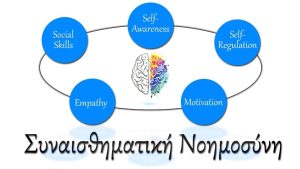What is emotional intelligence?
Emotional intelligence (EQ) is the ability to understand and manage your emotions, as well as the emotions of others. According to research, people with high emotional intelligence are more successful in their interpersonal relationships and in their professional lives. Daniel Goleman, one of the most well-known psychologists in this field, argues that emotional intelligence is as important as traditional intelligence (IQ) for success in life.
Key facts about emotional intelligence
Self-awareness: understanding your own emotions and motivations.
Self-control: ability to control your impulses and think before you act.
Empathy: Ability to understand the feelings of others.
Social skills: Ability to communicate and work effectively with others.
Motivation: Internal drive to achieve goals.
BOOK A RECONNAISSANCE APPOINTMENT HERE FOR ANYTHING THAT CONCERNS YOU
How to get emotional intelligence
Developing emotional intelligence is a process that takes time and effort. Here are some strategies you can implement:
1. 1.
Recording feelings: keep a journal of your feelings daily.
Self-analysis: ask yourself why you feel the way you feel in different situations.
2. 2.
Meditation.
Impulse Recognition: try to recognize when you feel the need to react impulsively.
3. Strengthen Empathy.
3: Pay attention to others when they are speaking, without interrupting.
Practicing Understanding: Try to put yourself in others’ shoes and understand their perspectives.
4. Improve Social Skills.
Networking: participate in social events or groups that interest you.
Communication: Practice open and honest communication with those around you.
5. Strengthening motivation.
Set Goals: Set personal and professional goals that excite you.
Celebrating Successes: Recognize and celebrate the small victories in your life.
What are the main models of emotional intelligence and how they differ
Emotional intelligence (EQ) has gained importance in recent years, as it is recognised as a critical factor for success at personal and professional level. There are three main models that define emotional intelligence, each with their own approaches and characteristics.
1. Competency model
Developed by Peter Salovey and John Mayer in 1990, this model views emotional intelligence as a measurable ability. It focuses on an individual’s ability to:
– Recognize emotions.
– Understand emotional information.
– Use emotions to solve problems.
– Manage the emotions of others.
This model includes four core competencies: perceiving emotions, understanding emotions, managing emotions, and using emotions to achieve goals.
2. Mixed model
The mixed model, mostly known through the work of Daniel Goleman, combines elements of competencies with personal characteristics. Goleman argues that emotional intelligence includes:
– Self-awareness: understanding your own feelings.
– Self-regulation: the ability to control your reactions.
– Empathy: Ability to understand the feelings of others.
– Social Skills: Ability to manage relationships and communicate effectively.
This model stresses the importance of applying emotional intelligence in everyday life and in the work environment.
3. Trait model.
Developed by Constantine Vasili Petrides, this model focuses on personal characteristics that influence emotional intelligence. It includes:
– Behavioral dispositions.
– Self-concept.
– Self-esteem.
This model emphasizes that emotional intelligence is not only a skill, but also a set of characteristics that determine how we react to different situations.
Comparison of Models
| Μodel | Main Characteristics | Focus |
| Competency Model | Perception, Understanding, emotion management | Immediate functions |
| Mixed Model | Self-awareness, self-regulation, empathy, social skills | Combination of skills & attributes |
| Features model | Behavioural dispositions, self-concept, self-esteem | Personal Characteristics |
Each model offers a unique perspective for understanding emotional intelligence, highlighting different aspects of human behaviour and interaction. The choice of the appropriate model depends on the goals and needs of the individual or group wishing to develop their emotional intelligence.
How emotional intelligence affects relationships and social life
Emotional intelligence (EQ) is critical to the quality of relationships and social life, as it affects the ability of individuals to understand and manage their own and others’ emotions.
Impact on relationships
High emotional intelligence contributes to healthy and stable relationships. Individuals with well-developed EQ are better communicative partners as well:
They recognize their feelings and express them clearly.
They understand the needs and feelings of others, enhancing connection.
They manage conflict effectively, promoting collaboration.
Social life
In social life, emotional intelligence affects a person’s ability to form and maintain social bonds. Individuals with high EQ:
– Are more sensitive to social dynamics and the needs of others.
– They create authentic relationships based on trust and understanding.
– They are more open to social challenges, adapt easily to new situations and show interest in those around them.
– Developing emotional intelligence can lead to better relationships, both personal and professional, enhancing a person’s social life.

How emotional intelligence can be improved
To improve emotional intelligence, there are many strategies and practices that you can apply in your daily life.
Here are the basic methods:
Self-awareness
Recognize your emotions: Ask yourself “What am I feeling right now?” Ask yourself “What are your feelings now?” throughout the day to increase your awareness of your feelings.
Record your thoughts: Keep a journal to track your emotional reactions and patterns1.
Self-management
Emotion management: learn to control your reactions to stressful situations and maintain a positive perspective.
Breathing exercises: Use deep breathing techniques to calm yourself during difficult times5.
Empathy
Listen actively: Pay attention to others and try to understand their feelings, both verbal and non-verbal.
Put yourself in their shoes: Practice empathy, imagine how you would feel if you were in their shoes2.
Social skills.
Communication: Develop effective communication skills such as active listening and clarity in expressing feelings.
Conflict management: learn to resolve conflicts in a positive way, recognising the needs of all parties involved.
Continuous Learning
Emotional Intelligence Training: Participation in programs or seminars that focus on the development of emotional intelligence.
Feedback: Be open to comments and criticism from others for improvement4.
Celebrate Successes
Acknowledge and celebrate your victories, no matter how small, to boost your confidence and sense of achievement.
By applying these strategies, you can boost your emotional intelligence and reap the benefits it offers, such as better relationships and increased mental health.
FIND US ON INSTAGRAM FOR ADVICE ON ISSUES THAT CONCERN YOU & QUESTIONS
Emotional intelligence is a practical process
Developing emotional intelligence is not just a theoretical concept, but a practical process that can significantly improve your life. With self-awareness, self-control, empathy, social skills and inner movement, you can become more effective in your relationships and in your career. Get started today!


